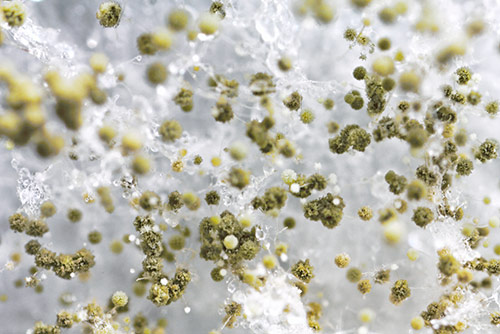The Risks of Inhaling Construction Dust and Mold Spores
 It might be hard to believe that your wellness could be impacted by something that's not even visible to the naked eye. But while mold spores and construction dust float invisibly in the air, they can trigger side effects that may lead to bigger problems concerning mold and your health.
It might be hard to believe that your wellness could be impacted by something that's not even visible to the naked eye. But while mold spores and construction dust float invisibly in the air, they can trigger side effects that may lead to bigger problems concerning mold and your health.
The World Health Organization (WHO) found a strong enough connection between mold and your health to publish guidelines for indoor air quality. Here are some of the more common complaints that can result from exposure to mold and construction dust.
1. Upper Respiratory Ailments
Allergic reactions are by far the most frequently reported results of inhaling dust and mold spores. The microscopic particles irritate and inflame membranes in the sinus passages, throat and lungs, even in people with no previous history of allergies.
If you experience chronic sneezing, coughing or wheezing, these could be signs of a mold illness. More dangerous conditions include aspergillosis, a disease that ranges from mild to serious, and hypersensitivity pneumonitis, which can lead to pulmonary fibrosis if left untreated.
2. Eye Irritation
Delicate membranes in your eyes are also vulnerable to mold and dust irritation, which can lead to redness, itching and tearing. These symptoms may also be accompanied by headaches.
3. Digestive Issues
While gastrointestinal problems are more likely to arise from eating moldy food, they can arise from ingesting mold spores and dust. Specific complaints include diarrhea, nausea and a depressed appetite.
Stomach discomfort often leads to weight loss, but surprisingly, weight gain can be a symptom of mold and your health. According to mold expert Dr. Mark Hyman, director of the Cleveland Clinic Center for Functional Medicine, ingestion of toxins can cause your immune system to respond by producing antibodies that alter your metabolism.
4. Muscle Pain and Numbness
After prolonged exposure to mold, some people have reported feeling muscular pain that can't be explained by physical activity. Others experience numbness or the pins-and-needles tingling that usually comes after a foot or hand has "fallen asleep."
5. Depression
The tie between mold and your health isn't limited to physical ailments. Depression and sadness are indirect but real reactions to mold and dust. These conditions often arise when you feel a lack of control over your environment.
Connections between mold and your health that occur less frequently are:
• Excessive thirst and urination
• Shaking and dizziness
• Metallic taste in your mouth
Mold and Your Health: A Real Connection
If you suffer any of these nagging symptoms that never seem to go completely away, don't assume you just have to live with them. Your physician can answer any questions you may have about mold and your health and refer you to a specialist if necessary.